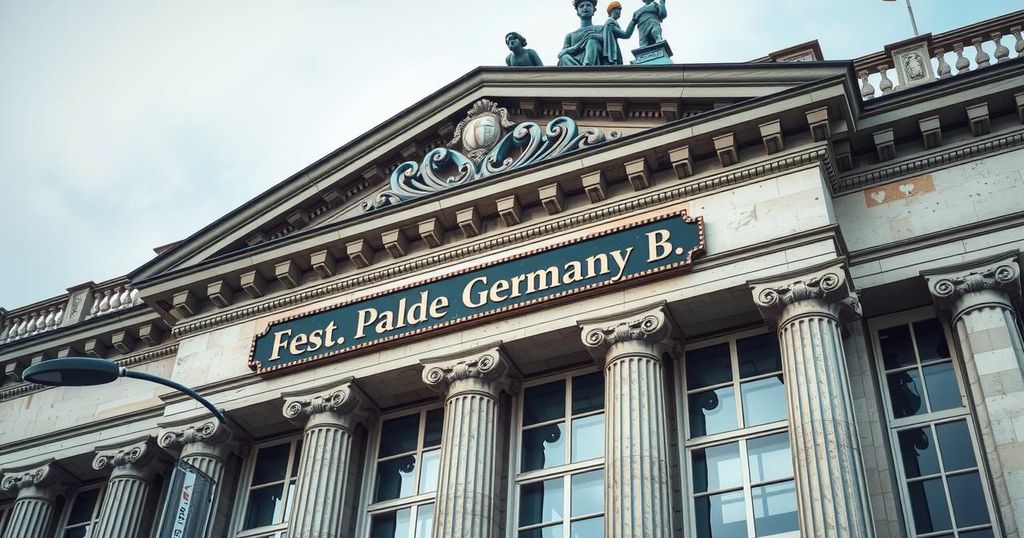German President Calls for Early Elections Following Coalition Collapse

German President Frank-Walter Steinmeier has dissolved parliament and set a February 23 election date after the collapse of Chancellor Olaf Scholz’s government. Internal conflicts and a recent car-ramming attack have intensified discussions on security and immigration policies. The conservative CDU/CSU leads in polling, while President Steinmeier calls for respectful campaigning against a backdrop of critical national challenges.
In a significant political development, German President Frank-Walter Steinmeier has officially dissolved the parliament and confirmed an early election date of February 23 following the collapse of Chancellor Olaf Scholz’s coalition government. This dissolution occurred amidst a backdrop of internal discord within the ruling coalition regarding strategies to rejuvenate the German economy, compounded by a tragic recent car-ramming incident at a Christmas market that has intensified nationwide discourse surrounding security and immigration policies. Steinmeier has called for a respectful and fair electoral campaign, underscoring the necessity for political stability in these challenging times.
The dissolution follows internal strife within the Scholz administration, which aims to advance the nation’s economic interests but has struggled amid varying party views. Moreover, the car-ramming attack in Magdeburg, which resulted in multiple casualties, has caused heightened urgency regarding national security measures, explicitly challenging existing policies. In response, both conservative and far-right parties are gaining traction in public opinion polls, with the conservative CDU/CSU currently leading at approximately 32%. The far-right Alternative for Germany (AfD) has also capitalized on the incident, advocating for stricter immigration controls and border closures.
In his remarks, President Steinmeier remarked on the pressing need for all electoral parties to approach the campaign transparently and free from external influences, particularly those from social media. He emphasized that “Hatred and violence must have no place in this election campaign, nor denigration or intimidation… all this is poison for democracy.” His concerns are echoed by the backdrop of a declining support for the Social Democrats, which are struggling with only around 15% in polls. Until a new government is established, Scholz will assume the role of caretaker chancellor.
The electoral landscape is complicated by critical issues including Germany’s position on foreign military aid, economic recovery strategies, and climate policies. Both major parties are looking to bolster Germany’s economic standing through an improvement of infrastructure and investments, with the CDU advocating for a reassessment of Germany’s nuclear energy policies in stark contrast to the SPD’s commitment to renewable energies. Further, the SPD proposes a significant investment package while insisting on maintaining fiscal constraints, a point that raises crucial discussions about economic management in upcoming debates.
The recent dissolution of the German parliament by President Frank-Walter Steinmeier and the subsequent announcement for an early election stems from the unraveling of Chancellor Olaf Scholz’s coalition government, which experienced severe disputes over economic revitalization strategies. The backdrop of political instability was exacerbated by a tragic car-ramming incident, which sparked renewed scrutiny of immigration and national security policies in the country. As Germany approaches the upcoming elections, there is significant public sentiment shifting towards conservative and far-right perspectives, raising concerns regarding the ideological direction of the nation. Amidst these political shifts, the future government’s response to pressing issues such as economic recovery, national security, and climate change remains paramount.
In conclusion, the dissolution of the German parliament and the call for elections on February 23 have opened a critical chapter in the nation’s political landscape, triggered by both internal governmental conflicts and external national safety concerns. With both the conservative CDU/CSU and the far-right AfD gaining momentum, the upcoming campaign will be pivotal in determining Germany’s policies on immigration, economy, and climate change. President Steinmeier’s call for a respectful discourse in the electoral process emphasizes the importance of democracy in navigating these complex and crucial issues facing the nation.
Original Source: www.easternprogress.com








